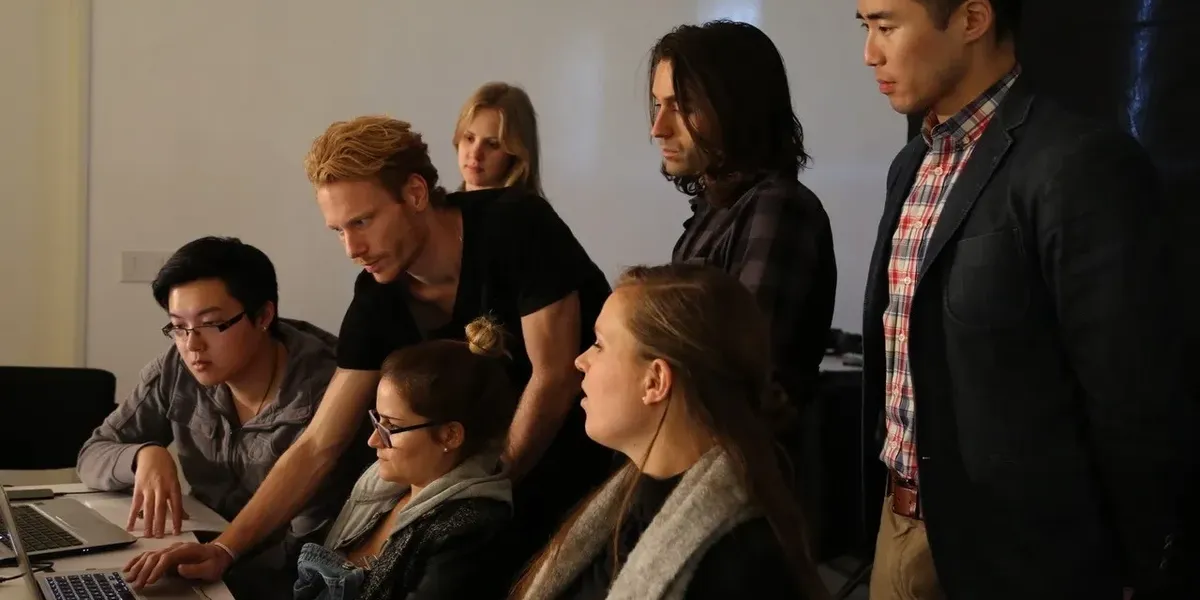
This post was written by Rani Mani and originally appeared on Adobe blog on Sept 5, 2023.

Raised in California, Geiseler grew up in the arts, immersing himself in music and film. But it was while studying politics and diplomacy at Princeton University that he was inspired to use art to motivate people around the world. Today, One Minute Academy has worked with non-profits, major brands such as National Geographic, and more than 80 United States Embassies and Consulates worldwide to promote communication skills and self-expression for thousands of workshop participants.
“80 percent of internet traffic is video, which is why it’s such an important medium for communication,” says Geiseler. “At One Minute Academy, we teach camera moves, aesthetics, interview techniques, and video editing — everything that students need to know to make compelling videos by themselves. When it comes to post production, we teach Adobe Premiere Pro. With the Adobe Creative Cloud app, I’ve found a way to connect with people on a global level and have a deep impact on students’ lives, one minute at a time.”

Helping Ukrainians Find Their Voice
When war broke out in Ukraine, both the local population and people around the world struggled to understand what was happening. It was the early videos emerging from the battlegrounds that allowed Ukrainians to share their stories across borders and build support from the global community.
When One Minute Academy held a workshop in partnership with America House in Kyiv, the virtual classroom was filled with Ukrainians from all walks of life, from university students to heads of nonprofit organizations. All came with the same purpose: they wanted to learn how to best tell their story.
“There were emotions and universal human truths being challenged by the political events in Ukraine,” says Geiseler. “I was asking myself what I could do. I couldn’t physically go there, but through One Minute Academy, we could teach people impacted by the war how to share their stories effectively and efficiently.”
Some participants wanted to simply share stories, culture, and news with other Ukrainians who were displaced by the war and living alone around the world. One woman made a short video about her virtual children’s museum that collects and preserves more than 1,000 pictures drawn by children affected by war. Another participant wanted to learn skills for her work collecting evidence of war crimes. By creating high quality, compelling videos of the evidence, she hopes to support cases in both Ukrainian and international courts.

“I want to spread awareness of this war because it hurts,” said one participant, a university student named Elana. “I love my country, my home. I want to show people why we fight. When I started, I was new to creating videos, but over five days, I got a lot of useful information about how I can use video to reach others in the world.”
“I am convinced of the exceptional value that One Minute Academy brings to storytellers around the world,” says Fred Cook, director, USC Center for Public Relations, Annenberg School for Communication and Journalism, University of Southern California. “Their work goes beyond teaching video production; they are in the business of empowering voices and creating a media landscape that is inclusive, diverse, and deeply human.”
Celebrating Women’s Entrepreneurship in Iraq
Over the course of a year, One Minute Academy, in partnership with the U.S. Embassy in Iraq, trained more than 1,000 storytellers in Iraq to film and edit professional one-minute videos. The goal? To support and inspire entrepreneurs throughout the country. The year-long partnership culminated with a One Minute Contest where participants were invited to make videos celebrating women’s entrepreneurship.

The 10 finalists all approached the topic of female empowerment and women’s entrepreneurship from different angles, showing the variety and power that can be achieved with a minute-long message. Some videos profiled women in the workforce, from a young woman experiencing workplace discrimination to a woman who started a tannour bread business that employs other local women. Others took a more artistic approach to the topic, such as a hopeful film of a young woman singing in a devastated city or even a fictional short story about an unusual job applicant.
“Entrepreneurship is a path to economic freedom and personal empowerment,” says Geiseler. “We are excited to support entrepreneurship, particularly for women. By helping people find their voice, we hope to build a better world and promote mutual understanding between people and nations.”
Fostering Media Literacy Around the World
One Minute Academy workshops are held around the world, from Vietnam and Azerbaijan to South Africa and El Salvador. The virtual courses are typically held two to three hours a day for five days. But the program is often adjusted to meet the needs of participants. One workshop in Myanmar was held during the social instability of the Spring Revolution, and One Minute Academy adjusted its approach by training local leaders to run smaller workshops using minimal and anonymous online communication. All participants receive a free seven-day trial of Premiere Pro so that they can learn to edit videos on their own time.
Through the One Minute Academy approach, Geiseler and his team are helping to foster broad media literacy and encourage people around the world to share their voices through dynamic video.

“One Minute Academy has a history of reaching diverse and marginalized communities with its work,” says Alan Davis, Europe, Asia & Eurasia director for the Institute for War and Peace Reporting. “One Minute Academy workshops are the best I’ve ever encountered for training someone with zero video production experience into a fully autonomous multimedia content creator.”

Learn more about One Minute Academy at its website. Read more compelling changemakers stories.
Author: Sponsored Content
This article comes from No Film School and can be read on the original site.
